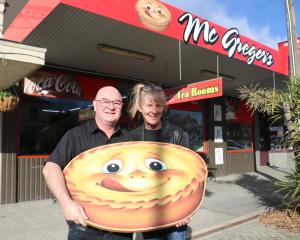Asia-Pacific sharemarkets remained cautious yesterday after Monday's global freefall again wiped billions of dollars in value off company values and markets notched up record losses.
The clamour to sell, ranging from "mom and pop" investors to the most aggressive and largest sovereign funds, reflected an urgency to turn falling share values into cash at any cost.
All cues were taken from the blue-chip Dow Jones index in New York which closed down for the fourth consecutive day on Monday at a four-year low below 10,000 points - despite a late steadying rally.
European shares, meanwhile, continued to plummet to book their worst day-losses.
Similarly, the Asia Pacific bourses reopened yesterday to repeat the cycle.
The New Zealand stockmarket initially went down more than 2.6% yesterday but rallied a little to close down 1.45% overall on light turnover of $76 million - a large increase on Monday's $46 million turnover.
Fletcher Building shares closed down 1.23% at $6.42, with Telecom down 0.36% at $2.78 and Contact Energy up 0.68% at $7.45.
ABN Amro Craigs broker Peter McIntyre said just as smaller investors were selling to improve their cash holdings, the large sovereign funds - such as state-owned pension funds - were repatriating billions to shore up home cash requirements.
Those in the Euro-zone were especially aggressive in the sell-off, he said.
Mr McIntyre said the SE50 rallied to some degree with investors taking advantage of defensive (utilities) stock, but it was too early to make a call on whether the market had bottomed out.
Despite the $US700 billion bail-out package agreement being accepted by Congress on Friday, it appeared it may not be implemented for four to six weeks, which was causing further investor anxiety, he said.
Forsyth Barr broker Peter Young said noticeably more buyers were in the market looking for basement prices.
Mr McIntyre said the reluctance of any government to implement a capital-gains tax on residential housing, and also the offering of wide-ranging tax off-sets, meant property owners had not diversified their assets enough to include investments and savings.
The New Zealand dollar yesterday continued its volatility, rebounding from an overnight two-year low of $61.7 c to to US63.38c at 5pm.
However, Mr McIntyre said, despite the rebound, the overall trend was for a falling dollar because commodity prices were easing and New Zealand was a commodity-based economy in recession.
In the short term, "cash is king" as shares were sold, but Mr McIntyre cautioned holding cash may not remain so attractive because of falling interest rates.
With the threat of world-wide recession, oil was down $US6 to $US87.81 a barrel yesterday.
Gold remained about $US875 per ounce on its London fix-price.
Mr McIntyre said investors historically turned to gold as a safe haven investment and he had expected increasing demand to go beyond $US1000 per ounce.
Late yesterday, the Reserve Bank of Australia lowered its interest rate from 7% to 6%, surprising analysts expecting a 0.5% cut, to encourage some consumer spending in the face of recession fears.
Mr Young said this prompted a turnaround on the Australian market, which had been trading down about 150 points, to push it up 32 points.
Like in New Zealand, more buyers were looking for bargains.
While the Reserve Bank of New Zealand cut its official cash rate last month to 7.5%, this remained the highest in the developed world, prompting Mr McIntyre to say Reserve Bank governor Alan Bollard needed to act more decisively and cut rates again.












